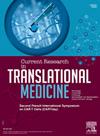AI-assisted computational screening and docking simulation prioritize marine natural products for small-molecule PCSK9 inhibition
IF 3
4区 医学
Q2 MEDICINE, RESEARCH & EXPERIMENTAL
引用次数: 0
Abstract
SARS-CoV-2 infection has been associated with long-term cardiovascular complications including myocarditis and heart failure, as well as central nervous system sequelae such as cognitive dysfunction and neuropathy. Proprotein convertase subtilisin/Kexin type 9 (PCSK9), a hepatic protease involved in cholesterol regulation, has shown associations with a spectrum of diseases potentially relevant to these Covid-19 complications, such as atherosclerosis. To identify novel human PCSK9 inhibitors, a custom virtual screening pipeline was developed employing (1) a convolutional neural network-based deep learning model, (2) molecular docking using Schrödinger with Glide scoring function, and (3) molecular dynamics (MD) simulations with Gibbs Free Energy Landscape analysis. The deep learning model was trained on a dataset of known central nervous system, cardiovascular, and anti-inflammatory acting drugs and used to screen the CMNPD database. Docking simulations were performed on shortlisted candidates, followed by MD simulations and free energy landscape analysis to evaluate binding affinities and identify key interaction residues. This multi-step in-silico approach identified promising PCSK9 inhibitor candidates with favorable binding profiles, suggesting that AI-assisted virtual screening can be a powerful tool for discovering novel therapeutic agents.
人工智能辅助的计算筛选和对接模拟优先考虑小分子PCSK9抑制的海洋天然产物
SARS-CoV-2感染与心肌炎和心力衰竭等长期心血管并发症以及认知功能障碍和神经病变等中枢神经系统后遗症有关。蛋白转化酶枯草杆菌素/可溶蛋白9型(PCSK9)是一种参与胆固醇调节的肝脏蛋白酶,已显示出与一系列可能与这些Covid-19并发症相关的疾病(如动脉粥样硬化)的关联。为了鉴定新的人类PCSK9抑制剂,开发了一个定制的虚拟筛选管道,使用(1)基于卷积神经网络的深度学习模型,(2)使用Schrödinger与Glide评分函数进行分子对接,以及(3)使用Gibbs自由能景观分析进行分子动力学(MD)模拟。深度学习模型在已知中枢神经系统、心血管和抗炎作用药物的数据集上进行训练,并用于筛选CMNPD数据库。对入围候选分子进行对接模拟,然后进行MD模拟和自由能景观分析,以评估结合亲和性并确定关键相互作用残基。这种多步骤的计算机方法确定了具有良好结合谱的有前途的PCSK9抑制剂候选物,这表明人工智能辅助的虚拟筛选可以成为发现新型治疗药物的有力工具。
本文章由计算机程序翻译,如有差异,请以英文原文为准。
求助全文
约1分钟内获得全文
求助全文
来源期刊

Current Research in Translational Medicine
Biochemistry, Genetics and Molecular Biology-General Biochemistry,Genetics and Molecular Biology
CiteScore
7.00
自引率
4.90%
发文量
51
审稿时长
45 days
期刊介绍:
Current Research in Translational Medicine is a peer-reviewed journal, publishing worldwide clinical and basic research in the field of hematology, immunology, infectiology, hematopoietic cell transplantation, and cellular and gene therapy. The journal considers for publication English-language editorials, original articles, reviews, and short reports including case-reports. Contributions are intended to draw attention to experimental medicine and translational research. Current Research in Translational Medicine periodically publishes thematic issues and is indexed in all major international databases (2017 Impact Factor is 1.9).
Core areas covered in Current Research in Translational Medicine are:
Hematology,
Immunology,
Infectiology,
Hematopoietic,
Cell Transplantation,
Cellular and Gene Therapy.
 求助内容:
求助内容: 应助结果提醒方式:
应助结果提醒方式:


